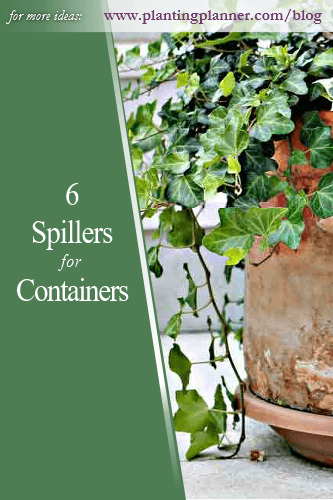from The Weatherstaff PlantingPlanner – intelligent garden design software
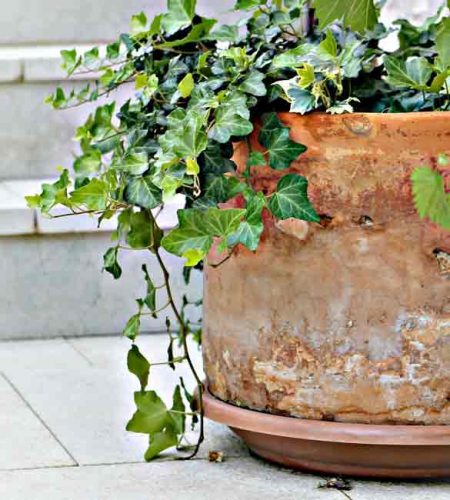
The Thrillers are the architectural plants, usually the tallest plants in the display. They provide the structure for your planting combination.
Next come the Fillers, the second layer of planting in the container. They add mass to the planting, as well as providing a contrast in shape and texture.
Finally, there is the third layer of plants, the Spillers. These are the trailing plants which, when squeezed in around the edge of the planting, will tumble over the sides and soften the boundaries. Where the filler can contrast with the thriller, the spiller can unify the display by echoing elements of the other two layers – picking out a secondary colour, for example. Plants with good spiller qualities are often the same ones as those chosen for ground cover in the border – easy-going plants which creep and spread, filling bare patches with colour. Here are my choices for fantastic spiller plants.
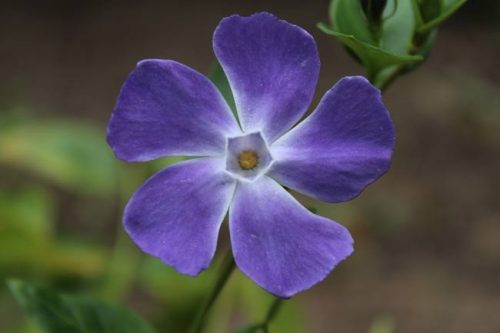
Vinca minor
Vinca minor (lesser periwinkle) provides low-spreading, flowering ground cover in the garden. Smaller and less vigorous than vinca major, it grows to 15cm in height so is perfect for container-planting. Pretty, violet-blue flowers are produced from mid-spring through to autumn.
There are a number of attractive varieties to choose from.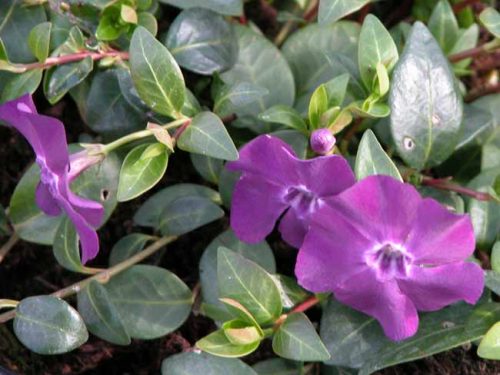
Vinca minor Atropurpurea has rich wine-purple flowers and glossy dark green leaves. It has been awarded the Royal Horticultural Society Award of Garden Merit (AGM). Vinca minor Illumination has variegated leaves – yellow with dark green margins – and soft blue flowers.
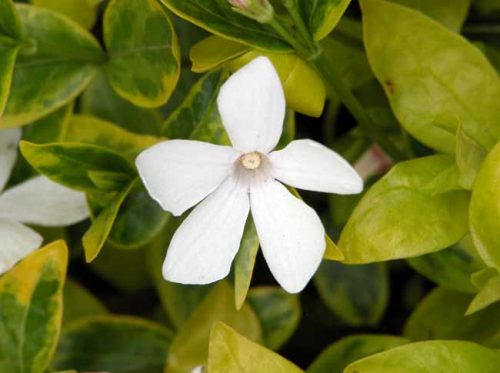
For white flowered varieties, try Vinca minor f. alba ‘Gertrude Jekyll’ or Vinca minor f. alba ‘Alba variegata’, which has dark green leaves with yellow borders.
Campanula
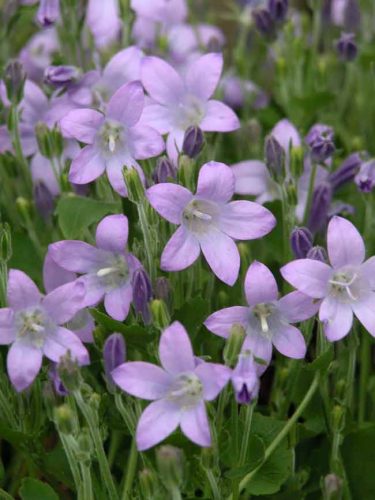
The trailing bellflower, Campanula poscharskyana, is a cheerful, long-flowering perennial. Masses of light purple-blue, star-shaped flowers appear from late spring and keep going right through to early autumn. Its small leaves are semi-evergreen, forming a low mound with spreading stems.
The cultivar ‘Stella’, with starry violet-blue flowers, has been awarded the Royal Horticultural Society’s AGM.
Lysimachia nummularia
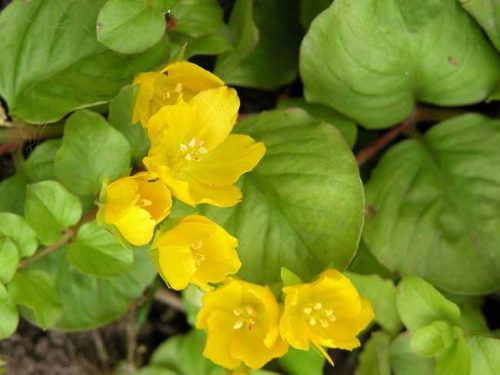
Lysimachia nummularia is a mat-forming, fast-growing perennial. In summer, bright yellow, cup-shaped flowers open amongst the small, rounded leaves. Lysimachia nummularia ‘Aurea’ (Golden creeping Jenny) has attractive golden-yellow foliage and has gained the RHS Award of Garden Merit.
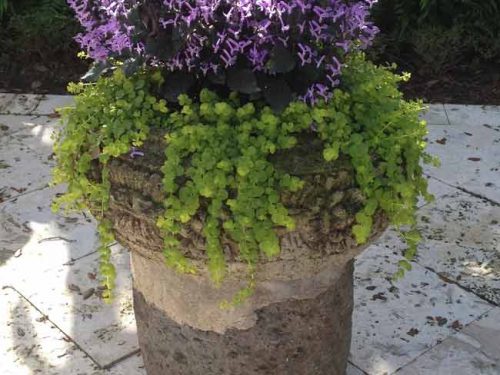
Lysimachia nummularia is very vigorous and can become invasive. Restrained in a garden container, it can happily spill over edges without danger of romping away.
Ivy
Common ivy, Hedera helix, is a self-clinging climber, but also provides useful ground cover and its trailing habit makes it a good choice for spilling over the edge of containers. There are a huge number of variegated forms.
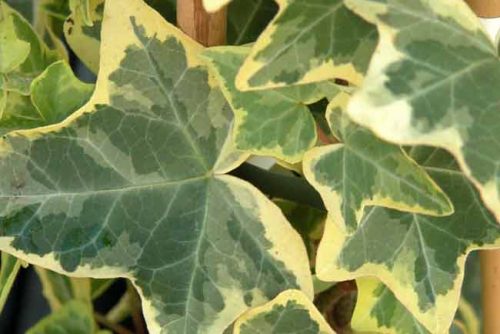
Hedera helix ‘Goldchild’, has grey-green leaves, margined yellow. ‘Glacier’ has small, grey-green leaves with silver green variegation and creamy margins. Both have earned the AGM.
Sometimes, variegated cultivars will revert to green. If this happens, just remove any shoots which are reverted.
Creeping Thyme
Thyme is an aromatic, evergreen herb. It is an excellent plant, both for groundcover and in containers. If you choose thyme as the third, ‘spiller’, layer in your container plantings, you will have a ready supply of sprigs to flavour your casseroles and add to stuffing mixes. And the bees and butterflies in your neighbourhood will love you.
The more upright or mound-forming thymes are useful as fillers – the second layer of planting. Choose the creeping thymes for a lower, trailing effect.
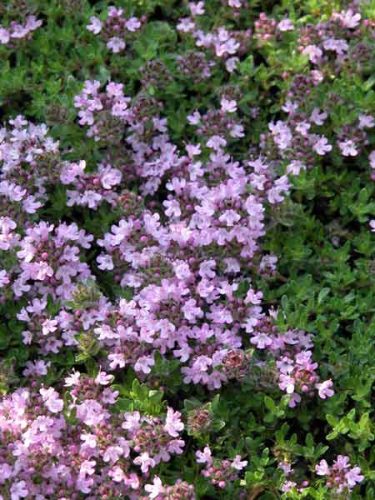
Thymus ‘Bressingham’ has a mat-forming habit, with grey-green leaves and tiny pink-purple flowers in summer. The creeping thyme, Thymus serpyllum ‘Snowdrift’, has small white flowers which smother its mid-green foliage in summer.
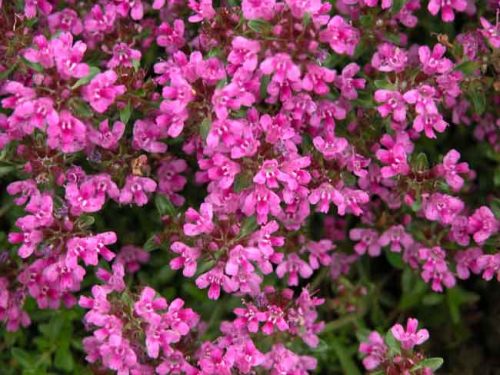
Thymus Coccineus Group, or Creeping Red Thyme, has bright magenta flowers in late spring or summer and small dark green leaves. (AGM).
Creeping or Moss Phlox
Low-growing phlox is perfect for spilling over stone walls, rock gardens and, of course, container edges. They are scented, easy-going and loved by pollinators.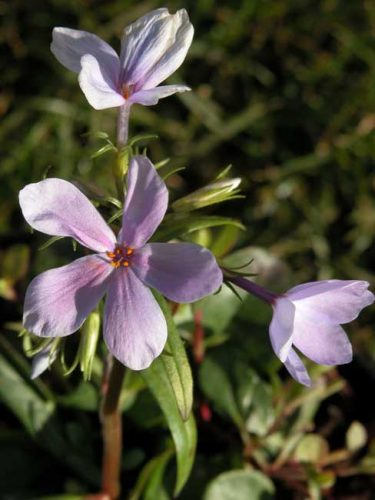
Phlox stolonifera ‘Blue Ridge’ (creeping phlox) has soft lilac-blue flowers, with prettily contrasting orange stamens. Provide a good mulch of well-rotted garden compost early in the year and you will be rewarded with masses of flowers in mid to late spring. Deadhead to keep the flowers coming.
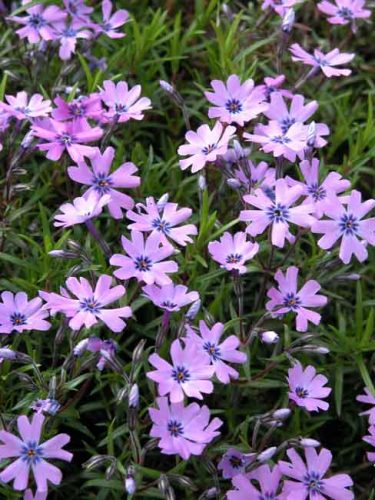
Phlox subulata, the moss phlox, is shorter, typically growing to just 10-15 cm. It is a sun worshipper but tolerates light shade. A mound of narrow dark green leaves is blanketed in late spring and early summer by a dazzling display of colourful flowers. Phlox subulata ‘Purple Beauty’ produces pale mauve flowers, with a darker eye. ‘McDaniel’s Cushion’ has large rose-pink flowers, while the flowers of ‘Scarlet Flame’ are flamboyantly red-pink.
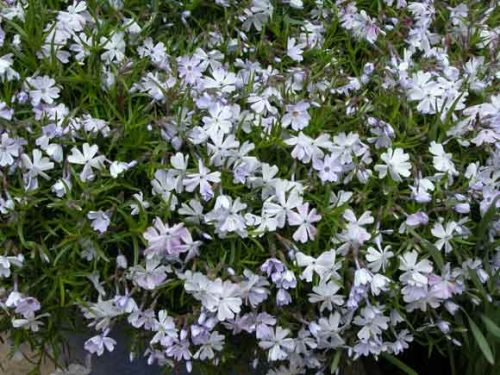
For subtler colours, try ‘Emerald Cushion Blue’ which has pale lavender-blue flowers, with a dark purple eye. ‘Bavaria’ is white, with an enchanting purple eye.
Pin for later
For more gardening ideas, click here to follow the Weatherstaff PlantingPlanner on Pinterest.


